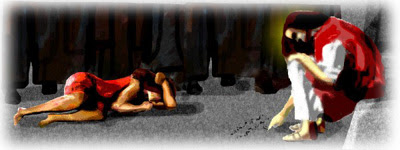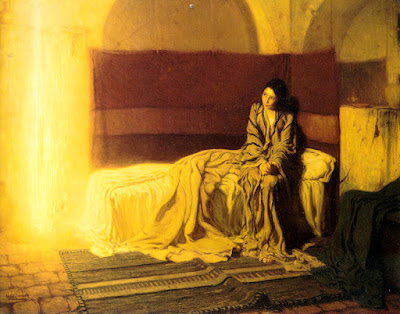Readings: Is 43:16-21; Ps 126; Phil 3:8-14; Jn 8:1-11
Do any of you watch those TV movies on the Hallmark and Great American Family networks? I recently read they’re the most popular movies on TV. So, it seems a lot of people like these sappy, feel-good movies.
They depict a world of personal, work, and family problems, all quickly solved by perfect solutions. And the plots? They really don’t vary much, do they? A workaholic or a struggling single parent suddenly encounters someone who at first just adds to life’s challenges. But over time relationships develop, and they’re attracted to each other. But then there arises a seemingly insoluble crisis, followed, of course, by a miraculous resolution, then the happily-ever-after kiss.
Just like real life!
The trouble with real life is that it not only has a present, but also both a past and a future. The past isn’t always pleasant, but we try to forget those unpleasant pieces of it. Unless, of course, your spouse, desiring only to improve you, kindly reminds you of past mistakes.
Today’s readings focus on past problems. In Isaiah, the Jews, exiled in Babylon, had been looking nostalgically to the days of Moses and Joshua, their liberation from Egypt and their entry to the Promised Land. But they were also reminded of their sinfulness and disobedience which led them into exile. Then God, speaking through His prophet, Isaiah, chastised them:
Remember not the events
of the past… see, I am doing something new!
Trust in me, God tells them. Put your sins and
idolatry behind you and serve the Living God. You remain My Chosen People; and
through you I will bring salvation to the world.
In our second reading we find St. Paul facing a past that was hard to forget. Before his miraculous conversion, Paul had been an active persecutor of Christians. Elsewhere, he tells us:
“I
not only shut up many of the saints in prison…but when they were put to death,
I cast my vote against them.” (Acts 26:10)
Despite this heavy burden, Paul knew that God had given him incredible graces. And so, he could remind us that he was
“...forgetting what lies behind but straining forward to what lies ahead.”
Paul didn’t forget all God had done for him.
And we, too, must thank God for not leaving us where we were. But like Paul, we
can’t live in the past.
And that, sisters and brothers, is real life: past, present, and future. And to see it manifested in its fulness, just turn to the Gospel. For Jesus didn’t water down the problems, and the solutions can be hard indeed.
Just consider today’s passage from John. It’s not a little made-for-TV story, is it? No, the situation and the people are very real. It’s about life and death, about sin and hatred and human judgment. It’s about divine forgiveness, about salvation and eternal life.
Picture it: scribes and Pharisees, spiritually entombed by an intractable understanding of the Law, dragged this woman, an adulteress, before Jesus, and surrounded her. They were so sure of themselves, weren’t they?
Yes, they’d used her, this woman who meant nothing to them. The used her to entrap Jesus, whom they considered an ignorant Galilean bumpkin. So they tossed the case to Jesus. Let Him solve this one, in front of everyone, right here in the Temple area.
Should we stone her as Moses prescribed? What do you say, teacher?
A "YES" would deny His own teaching – His behavior with sinners – and also violate Roman law, for only the Romans could execute. A "NO" would violate Mosaic law and show Himself to be a heretic of sorts. Once again, the scribes and Pharisees were certain they had entrapped Jesus.
Just try to imagine how the woman felt. Probably
petrified. Is she about to die? Will they stone her? And who is this man? Why did they bring her to Him?
Jesus says nothing. He bends down and with his
finger writes in the dust of the ground.
But the mob of holy men is impatient and press Him for an answer. So, Jesus just straightens up and utters those remarkable words:
“Let the one among you who is without sin be the first to throw a stone at her.”
Again, He bent down and wrote in the dirt. What does He write in that dust beneath their feet? Names? Sins? John doesn’t tell us. We can only guess.
One thing we know for certain. Jesus Christ, the Creative Word of God, “Who formed man out of the dust of the ground,” spoke and then wrote words that day in that same dust. And the effect? The scribes and Pharisees disperse, “one by one, beginning with the elders” – presumably those, like many of us here, whose memories are filled with a longer list of sins.
Yes, Jesus confronted a lot of sinners that day. An adulteress, who represents us all, all who need and seek forgiveness. But the scribes and Pharisees represent us too. It’s easy to slide into their kind of sinfulness, their self-righteous judgment of others. How easy it is to condemn rather than extend love and compassion.
The contrast is vivid: The woman,
now alone with Jesus, hears His voice.
“Has no one condemned you?…Neither do I condemn you. Go, sin no more.”
You see, brothers and sisters, we are blessed with a God who forgives and forgets. The woman will never forget her past, for it brought her to forgiveness and salvation. But she cannot live in it. For she is all of us, everyone from Adam until judgment day, all of us in need of salvation, in need of forgiveness, in need of a Savior.
She’s the very story of salvation, of sin and mercy, of sin committed and sin forgiven. She, like Paul, like the exiled Israelites, like you and I, cannot live in the past; for all of us are called to a new life brought to us by a Savior, God’s only Son. She must go and sin no more, while striving to know and love the God who refused to condemn her.
No, we can’t and shouldn’t live in the past. A sense of nostalgia is a normal, human reaction to the constant change we encounter in the world, in our lives, in our Church. But to try to live in the past, to focus only on what once was…well, that can blind us to God’s continuing shower of gifts.
The point is, the Church remains God’s community of salvation, in which He acts through His people, through you and me. God acts right here. Through the sacraments, the Holy Spirit sanctifies us, making us holy.
Of course, we can also crumble under life’s challenges, and they come in many flavors: debilitating illness, financial problems, aging, assisted living, death of a spouse, wayward children, addictions, family problems…so many things that can turn us from God’s love. If we allow it, they can diminish us, tempt us to look only to happier, more stable times…
But as Christians the glory days aren’t in the past; they’re still ahead: life with Christ in glory. We must keep growing until we die; for full oneness with the living Christ, is never perfected here.
You and I must “strain forward” as Paul did; and keep dying with Christ so as to live more fully. For the true disciple of Jesus Christ, tomorrow is always better than yesterday. Each day is a new creation in the presence of a living, loving, merciful God.
And just like the woman in the Gospel, we must learn to accept Christ’s forgiveness. So many people don’t. They go through life, wallowing in guilt, afraid of hell, tormented by their pasts, burdened by brokenness and human frailty. This isn’t why God became man. This isn’t why He died that death on that dark Friday afternoon.
“Christ loved me,” St. Paul insisted, “and gave Himself for me.” And that love is present, even in my sinfulness. So, fix your eyes not on yesterday’s sin, but on today’s forgiveness and tomorrow’s hope. Repent, yes, but to repent is to re-think, to change. Repentance that saves is not a ceaseless self-scourging, but fresh self-giving, a new birth of love.
Barely two weeks of Lent remain. If you really want to rise with Christ, repeat the song He sings to you:
“Behold,
I am doing a new thing; now it springs forth.”
Come to think of it, as Christians, we are the new thing. And it’s far better than any Hallmark movie. Why not spring forth?
Do so gloriously, rejoicing in God’s mercy, His forgiveness, and the New Life, the eternal life He offers to every one of us.



